Introduction
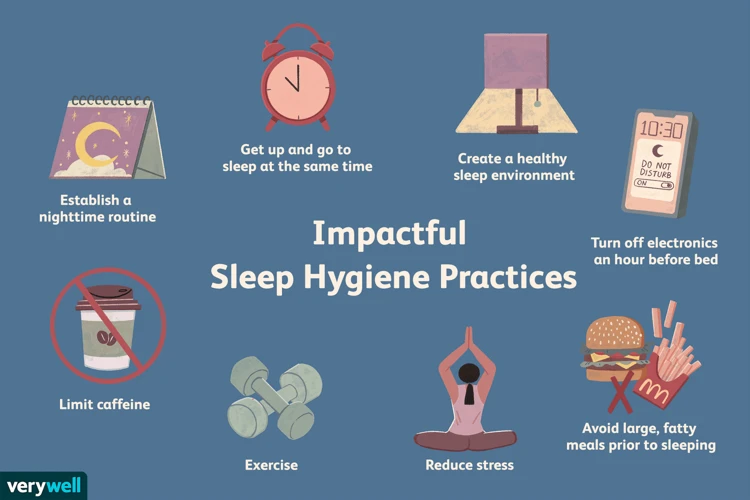
Getting a good night’s sleep is vital, not just for feeling rested and alert the next day, but for overall health and well-being. However, many people struggle to achieve a restful night’s sleep due to poor sleep hygiene, which refers to the practices and habits that affect sleep quality. Establishing healthy sleep habits and maintaining good sleep hygiene is key to improving the quantity and quality of sleep. In this article, we will cover the best practices you can implement to create a sleep-friendly environment, establish a consistent routine, practice healthy habits, and cope with stress and anxiety.
The Importance of Good Sleep Hygiene
Maintaining good sleep hygiene is crucial for overall health and well-being. Research shows that inadequate sleep can lead to a range of health problems, including obesity, diabetes, cardiovascular disease, and depression. It is essential to give proper attention to your sleep habits and hygiene to avoid these negative consequences. Here are some reasons why good sleep hygiene is crucial and should not be ignored:
- Improved cognitive Function: Good sleep hygiene promotes better cognitive function, including memory, focus, and concentration. Adequate sleep also helps improve creativity and problem-solving abilities.
- Enhanced Physical Performance: High-quality sleep can boost athletic performance by improving strength, agility, and reaction time. It helps to reduce inflammation, accelerate muscle recovery, and boost endurance.
- Reduced Risk of Accidents: Fatigue caused by improper sleep hygiene can cause workplace and traffic accidents by affecting reaction time, focus, and attention.
- Better Immune Function: Sufficient sleep promotes better immune system function by helping the body produce more germ-fighting antibodies and white blood cells.
- Improved Mood: Good sleep hygiene can help reduce symptoms of depression and anxiety, as well as improve mood and emotional regulation.
Clearly, maintaining good sleep hygiene is crucial for our overall health and well-being. It is essential to adopt healthy sleep habits and stick to them to improve our cognitive function, physical performance, reduce the risk of accidents, boost our immunity, and enhance our mood. It’s time to prioritize the importance of good sleep hygiene and make it an integral part of our daily routine.
Establish a Routine
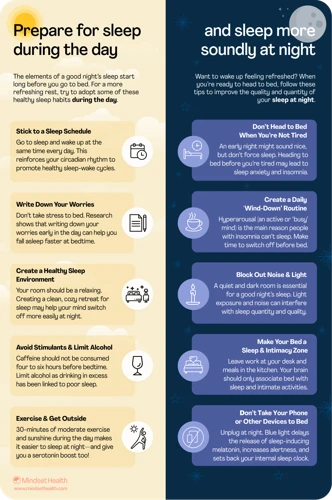
One of the fundamental pillars of maintaining good sleep hygiene is establishing a routine. Creating a structured sleep schedule and sticking to it can help regulate the body’s internal clock and improve overall sleep quality. In this section, we will go over some important practices for establishing a routine and wind-down rituals that will help prepare the body and mind for restful sleep. So let’s dive in and explore some of the key steps you can take towards developing a healthy sleep routine.
Stick to a Regular Sleep Schedule
One of the most important aspects of good sleep hygiene is consistent and regular sleep patterns. This means going to bed and waking up at the same time every day, even on weekends. Not only can irregular sleep patterns lead to a feeling of confusion and disorientation, but they can also disrupt the body’s natural circadian rhythms, leading to difficulty falling asleep and staying asleep.
To establish a regular sleep schedule, you can:
- Choose a bedtime that allows you at least 7-8 hours of sleep each night.
- Set an alarm to wake up at the same time every day, even on days off.
- Avoid napping during the day, or limit naps to 20-30 minutes.
The benefits of maintaining a regular sleep schedule include:
- Improved sleep quality and duration.
- Reduced daytime fatigue and sleepiness.
- Increased productivity and concentration during the day.
- Better overall mental and physical health.
However, it is important to note that certain circumstances may require a temporary deviation from your regular sleep schedule, such as:
- Travel across time zones.
- An early morning flight or work shift.
- An illness that disrupts sleep.
In these cases, it is important to prioritize sleep as much as possible and return to your regular schedule as soon as possible.
Create a Wind-Down Routine
A wind-down routine is an essential part of ensuring a good night’s sleep. It helps to prepare your mind and body for rest and relaxation. Here are some ideas for creating a wind-down routine that works for you:
- Avoid Strenuous Activities: Engaging in strenuous activities before bed can make it difficult for your body to relax. It is important to avoid activities that increase your heart rate and adrenaline levels, such as intense exercise or emotionally charged conversations.
- Take a Warm Bath or Shower: Taking a warm bath or shower before bed can help you to relax and unwind after a long day. It can also help to lower your body temperature, which can lead to better sleep.
- Read a Book: Reading a book can be a relaxing and enjoyable way to wind down before bed. Try to avoid reading from electronic devices like tablets or smartphones, which emit blue light that can disrupt your sleep.
- Listen to Soothing Music: Listening to slow, soothing music can help calm your mind and reduce anxiety levels. It can also help to drown out any distracting noises that may interfere with your sleep.
- Practice Gentle Stretching: Practicing gentle stretching or yoga poses can help to loosen any tension in your muscles and help you relax. This can be especially helpful if you spend a lot of time sitting or have a physically demanding job.
Remember, everyone is different, and what works for one person may not work for another. Try experimenting with different wind-down activities until you find a routine that works for you. The key is to be consistent and stick to your routine as much as possible to help signal to your body that it is time for sleep.
Avoid Screens Before Bed
It’s important to avoid screens before bed because the blue light emitted by electronic devices can interfere with the body’s production of melatonin, a hormone that helps regulate sleep. Screens also stimulate the brain and make it harder to wind down and fall asleep. Here are some tips for avoiding screens before bed:
| Tip | Description |
| Avoid using devices for at least an hour before bed | Put away all electronic devices such as phones, tablets or laptops at least an hour before bed time as they can cause over-stimulation and prevent the brain from winding down. |
| Use the night mode feature | Most modern devices have a night mode that reduces the blue light emitted. By decreasing the blue light, it will be easier for your body to produce melatonin and prepare for sleep. |
| Read a book instead | Reading a book is a great alternative to using electronic devices before bed. Not only does it help your brain to wind down, but it can also help you fall asleep faster. |
| Listen to calming music or a podcast | If you must use a device before bed, try listening to calming music or a relaxing podcast instead of scrolling social media or watching a show. |
By following these tips and avoiding screens before bed, you can create a more conducive environment for sleep and improve the quality of your rest.
Create a Sleep-Conducive Environment
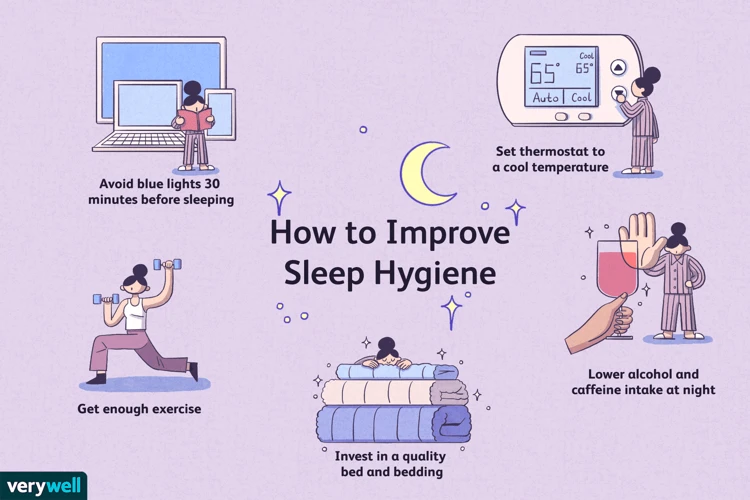
Getting a good night’s rest is essential for our physical and mental well-being. One of the keys to achieving quality sleep is creating a sleep-conducive environment in your bedroom. By minimizing disruptions and making your sleeping environment as comfortable and relaxing as possible, you can help promote restful and restorative sleep. In this section, we will explore several best practices for creating an ideal sleep environment that will help you fall asleep faster and stay asleep longer.
Make Your Room Dark, Quiet, and Cool
The environment in which we sleep plays a significant role in the quality of our sleep. Creating a dark, quiet, and cool room can be critical in promoting a restful sleep. Here are some ways to achieve this:
| Make the room dark | Avoid bright lights, even from small devices like phones or alarm clocks, as they can disrupt the production of the sleep hormone melatonin. Invest in blackout curtains or eye masks to ensure minimal light enters the room. |
| Make the room quiet | Noises, such as traffic, sirens or even snoring, can interfere with our sleep. Blocking out the sounds with earplugs, white noise machines or fans can help to maintain a peaceful sleeping environment. |
| Make the room cool | The ideal temperature for sleep varies between individuals, but most people sleep better in a cool room between 60-67 degrees Fahrenheit. It is essential to consider the bedding and pajamas worn, as they can also affect the temperature of the body. |
By taking some steps to create a comfortable sleeping environment like adjusting light and noise levels and finding a comfortable temperature, we can improve our chances of getting restful and restorative sleep.
Invest in a Comfortable Mattress and Pillows
When it comes to maintaining good sleep hygiene, investing in a comfortable mattress and pillows is key.
- Consider your sleeping position: The type of mattress and pillows you choose should depend on your preferred sleeping position. For example, if you sleep on your back, you may want to consider a firmer mattress to ensure proper spinal alignment. If you’re a side sleeper, a softer mattress may be more comfortable.
- Choose the right material: The material of your mattress and pillows can also impact your sleep quality. Memory foam, for example, can mold to your body and provide ample support, while a traditional spring mattress may cause uncomfortable pressure points.
- Find the perfect pillow: Just like your mattress, your pillows should provide proper support for your head and neck. Consider the material, size, and shape of the pillow to ensure it fits your needs.
- Replace old bedding: Over time, mattresses and pillows can lose their shape and support. It’s important to replace them every 7-10 years to maintain optimal comfort and hygiene.
- Try before you buy: Don’t be afraid to test out mattresses and pillows before making a purchase. Many stores offer trial periods to help you find the perfect fit.
Investing in a comfortable mattress and pillows can improve your quality of sleep and help you wake up feeling refreshed and ready for the day.
Minimize Disruptions, Such as Pets or Noise
To get the most out of your sleep environment, it’s important to minimize disruptions that could interfere with your rest. Here are some tips to help you achieve a peaceful sleeping space:
- Maintain a Quiet Environment: Loud noises can be disruptive, making it difficult to fall and stay asleep. Consider adding a white noise machine or fan to help drown out any outside disturbances such as traffic or neighbors. If you live in a noisy area, earplugs can be a cheap and effective solution to create a more peaceful environment.
- Reduce Pet Interference: While pets can provide comfort and companionship, they can be disruptive to sleep. Some pets may have trouble staying quiet at night, or may move around in the bed, distracting you from your sleep. To minimize this, consider setting up a separate sleeping space for your pet or using a pet bed near your own bed to keep them close while still limiting interference.
- Eliminate Light Exposure: Light from street lamps and electronics can disrupt sleep cycles, making it harder to fall asleep and stay asleep. Use heavy curtains or consider investing in blackout shades to keep out unwanted light. If you wake up in the middle of the night, try to avoid checking your phone or turning on any bright lights as this can signal to your brain that it’s time to wake up.
By reducing disruptions such as noise and light, you can create a sleep-conducive environment that helps promote better sleep quality.
Practice Healthy Habits
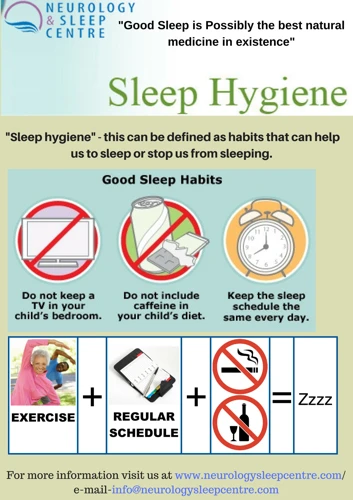
In addition to establishing a routine and creating a sleep-conducive environment, practicing healthy habits is also crucial for good sleep hygiene. Maintaining a healthy lifestyle can significantly improve the quality and duration of your sleep. It is important to pay attention to your diet, exercise regularly, and avoid certain substances before bedtime. In this section, we will explore some of the most effective and recommended healthy habits to ensure a good night’s sleep.
Exercise Regularly
Regular exercise can significantly improve the quality of your sleep. Studies show that participating in moderate exercise for at least 30 minutes a day can increase the amount of time spent in deep sleep, which is crucial for feeling rejuvenated and refreshed in the morning. Exercise can also decrease the time it takes to fall asleep and reduce the frequency of nighttime awakenings.
To incorporate regular exercise into your routine, consider adding it as a daily activity on your schedule. Make sure to choose an activity that you enjoy, such as running, cycling, yoga, or swimming, to keep you motivated.
It is important to note that while regular exercise can have positive effects on sleep, exercising too close to bedtime may actually have the opposite effect. This is because exercise can increase the body’s production of the hormone cortisol, which can make it difficult to fall asleep.
To avoid this, try to schedule your exercise routine in the morning or early afternoon to give your body enough time to wind down before bed. If you prefer exercising in the evenings, consider low-impact activities such as stretching or taking a relaxing walk.
In addition to benefiting your sleep, regular exercise can also have other positive effects on your overall health and well-being. So, make sure to make it a priority in your daily routine! Here are some tips to incorporate exercise in your life:
- Join a gym
- Sign up for virtual or in-person classes
- Make a commitment with a workout partner
- Plan outdoor activities like hike
Eat a Balanced Diet and Avoid Late-Night Snacks
It is essential to practice healthy eating habits for maintaining good sleep hygiene. A balanced diet not only helps in physical well-being but also promotes better sleep. Here are some tips for healthy eating habits and avoiding late-night snacking:
| Tip | Description |
|---|---|
| Stick to a schedule | Eating meals at consistent times each day helps regulate the body’s metabolism and internal clock, leading to better sleep. |
| Include all food groups | A balanced diet includes a variety of fruits, vegetables, whole grains, protein, and healthy fats. These foods provide essential nutrients that support overall health, including sleep. |
| Avoid heavy meals before bedtime | Eating a large, heavy meal before bed can cause discomfort, indigestion, and disrupt sleep. It is recommended to have a light snack before bedtime, such as a small fruit, crackers, or a glass of milk. |
| Avoid stimulants | Caffeine, nicotine, and alcohol are stimulants that can interfere with sleep. It is best to avoid consuming these substances at least 4-6 hours before bedtime. |
| Stay hydrated | Drinking enough water throughout the day can improve overall health and sleep. However, it is recommended to limit liquid intake before bedtime to avoid frequent bathroom breaks that can disrupt sleep. |
By following a balanced diet and avoiding late-night snacking, individuals can positively influence their sleep quality and overall health.
Avoid Caffeine, Alcohol, and Nicotine Before Bed
If you want to maintain good sleep hygiene, it is important to avoid consuming stimulating substances before bedtime. This includes caffeine, alcohol, and nicotine, which can all interfere with your ability to fall asleep and stay asleep.
Caffeine, in particular, is a stimulant that can keep you alert and awake long after you consume it. It is found in many beverages, including coffee, tea, soda, and energy drinks. To avoid disrupting your sleep, try to avoid consuming caffeine within 6 hours of bedtime. Be aware that some sources of caffeine, such as chocolate, may also contain smaller amounts that can still have an impact on your sleep.
Alcohol may seem like it can help you relax and fall asleep faster, but in reality, it can actually disrupt your sleep later in the night. Drinking can cause you to wake up more frequently and make it harder for you to reach and stay in deep, restorative sleep. It’s best to avoid alcohol altogether before bed or limit yourself to one drink earlier in the evening.
Nicotine, found in cigarettes and e-cigarettes, is also a stimulant that can interfere with your sleep. It can cause you to feel more alert and make it harder to fall asleep. Nicotine withdrawal symptoms may also wake you up during the night. Quitting smoking is beneficial for many aspects of your health, including sleep quality.
To summarize, avoiding caffeine, alcohol, and nicotine before bed can help you fall asleep faster, stay asleep longer, and wake up feeling more rested. Try to avoid these substances within several hours of bedtime, and if necessary, seek support to help you quit smoking or drinking.
Cope with Stress and Anxiety
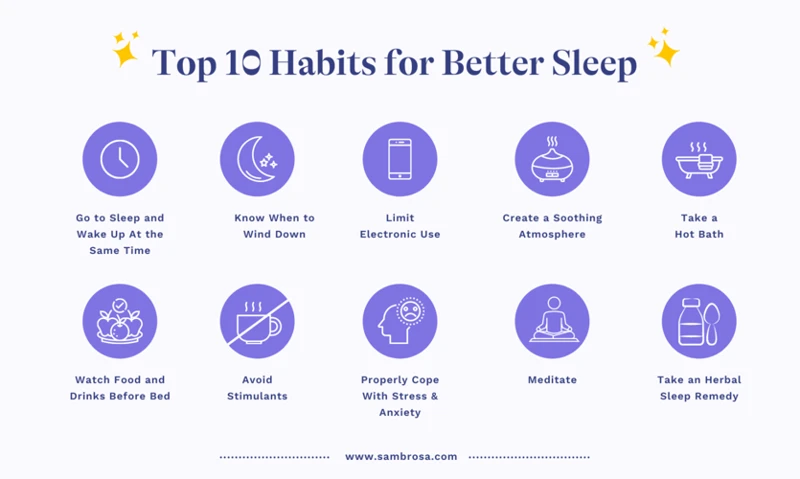
For many people, stress and anxiety can be major barriers to getting a good night’s sleep. These feelings can interfere with our ability to relax and drift off, leaving us feeling tense and restless. While it may seem easier said than done, developing effective coping mechanisms for stress and anxiety can significantly improve our sleep hygiene. In this section, we will explore some strategies for managing these emotions and promoting a more peaceful state of mind before bed.
Develop a Relaxation Technique, like Meditation or Breathing Exercises
One effective way to cope with stress and promote good sleep hygiene is by developing a relaxation technique. This could involve activities like meditation or deep breathing exercises. Practicing these techniques regularly can calm the mind, reduce anxiety, and improve sleep quality. Here are some tips for developing your relaxation practice:
- Find a quiet and comfortable space: Choose a peaceful and distraction-free environment where you can sit or lie down comfortably.
- Set a time limit: Start with a few minutes per day and gradually increase the time as you become more comfortable with the practice.
- Focus on the breath: Deep breathing can decrease heart rate and lower blood pressure, inducing a sense of relaxation. Inhale deeply through your nose, hold it for a few seconds, and exhale slowly through your mouth.
- Visualize a calming scene: Close your eyes and imagine yourself in a peaceful and serene environment. This technique can help you release tension and reduce stress.
- Try guided meditation: Listening to a guided meditation track can be a helpful tool to guide you through the relaxation process.
By incorporating relaxation techniques into your daily routine, you can reduce stress, improve your mood and enhance your overall sense of well-being. Remember, developing a relaxation practice takes time and patience, so be kind to yourself as you cultivate this healthy habit.
Write Down Worries or To-Do Lists to Clear Your Mind
One effective way to clear your mind before bed is to use a journal or notepad to write down any worries or tasks on your to-do list. This can help ease anxiety and prevent racing thoughts that may keep you up at night.
Here are some tips for this practice:
- Take a few minutes before bed to sit down in a comfortable and quiet space.
- Start by writing down any worries or concerns that are currently on your mind.
- Then, make a list of any tasks or errands that need to be accomplished the next day or week.
- Try to organize your list by priority or by the time of day the task needs to be completed.
- Once everything is written down, let it go. Trust that you will be able to address any concerns or complete any tasks tomorrow.
- If you find your mind wandering back to your list or worries, gently remind yourself that you have already written them down and that it’s time to rest.
By reducing mental clutter through this practice, you may find it easier to fall asleep and wake up feeling more refreshed. Remember to keep your notebook or journal next to your bed so if necessary, you can jot down additional thoughts that pop up in the middle of the night.
Avoid Strenuous Mental or Physical Activity Close to Bedtime
It’s important to avoid any activity that requires significant mental or physical exertion close to bedtime. If your mind and body are still stimulated, it may take longer for you to fall asleep as your brain and muscles are still active. Here are some tips to follow:
- Avoid mentally stimulating activities before bed: Activities such as work-related tasks, studying, or even engaging in intense conversations can stimulate your brain and make it difficult to unwind. Instead, try reading a book, taking a warm bath, or listening to calming music to relax your mind.
- Avoid physically stimulating activities: Strenuous exercise, such as cardio or weight lifting, can increase your heart rate and keep your body energized, making it difficult to fall asleep. Avoid working out at least 2-3 hours before bedtime.
- Avoid activities that increase your stress level: Stress can cause your cortisol levels to rise, making it difficult to fall asleep. Try avoiding any activities that cause anxiety or stress you out before bedtime.
Instead of engaging in activities that require mental or physical stimulation before bed, try to find ways to relax and unwind. This will help you to prepare for a good night’s rest and ensure that you can fall asleep quickly and stay asleep throughout the night.
Consider Seeking Professional Help
Despite our best efforts to establish healthy sleep habits, some individuals may still struggle with maintaining good sleep hygiene. If you find that you consistently have trouble falling or staying asleep, experience frequent daytime fatigue or irritability, or have unusual sleep behaviors, it may be time to seek professional help. While some individuals may be hesitant to do so, it’s important to remember that seeking help is a proactive and positive step towards improving your overall health and well-being. Fortunately, there are a variety of resources available to help address sleep-related concerns, ranging from primary care physicians to sleep specialists. In the following sections, we’ll explore some of the options worth considering to help you get the restful sleep you deserve.
Talk with a Doctor or Sleep Specialist if You Have Chronic Sleep Issues
If you are consistently having trouble with getting restful sleep, it may be time to consider seeking out the assistance of a medical professional. Chronic sleep issues can have a significant negative impact on not only your sleep, but also your overall health and well-being. There are many possible causes of chronic sleep issues such as sleep apnea, restless leg syndrome, and insomnia, among others.
In order to determine the root cause of your sleep issues, it can be helpful to consult with a doctor or sleep specialist. They can help assess any underlying health conditions that may be affecting your sleep and recommend treatment options accordingly. For instance, if you have sleep apnea, a doctor may recommend using a continuous positive airway pressure (CPAP) machine to help you breathe better during the night. It is important to address chronic sleep issues as they can lead to significant long-term health problems, such as diabetes, hypertension, and depression.
Additionally, if you have tried implementing healthy sleep hygiene practices without success, a medical professional can help identify any potential underlying causes or factors that may be hindering your ability to get restful sleep. For example, if you have tried minimizing disruptions in your sleep environment and practicing relaxation techniques, but still find yourself waking up frequently throughout the night, a doctor can help determine if there are any underlying sleep disorders at play.
If your chronic sleep issues persist despite your efforts to implement healthy sleep hygiene practices, it may be time to seek out the assistance of a medical professional. They can help identify any underlying sleep disorders or health conditions and recommend effective treatment options. Remember, getting restful sleep is essential to your overall health and well-being, so don’t hesitate to seek out professional help if needed.
| What to do if you have chronic sleep issues? | Talk with a Doctor or Sleep Specialist |
| What are some potential causes of chronic sleep issues? | sleep apnea, restless leg syndrome, insomnia, among others |
| What are potential long-term health problems caused by chronic sleep issues? | diabetes, hypertension, depression |
| What can a doctor help identify? | Any potential underlying causes or factors that may be hindering your ability to get restful sleep. |
Conclusion
In conclusion, maintaining good sleep hygiene is essential for our physical, mental and emotional well-being. By establishing a routine, creating a sleep-conducive environment, practicing healthy habits, coping with stress and anxiety, and seeking professional help if necessary, we can improve the quality of our sleep and promote overall health.
However, it’s important to acknowledge that establishing good sleep habits is not always easy. We live in a fast-paced world where stress and distractions are common, making it challenging to unwind and settle down for a restful night’s sleep.
That being said, it’s crucial to prioritize our sleep and make it a priority. So, we should commit to making the necessary changes to our routines and environments to create a conducive atmosphere for sleep. Additionally, we should strive to practice healthy daily habits that promote good sleep, such as exercising regularly, avoiding caffeine, alcohol and nicotine, and minimizing distractions before bed.
If we continue to struggle with poor sleep despite implementing these changes, we shouldn’t hesitate to seek professional help. A doctor or sleep specialist can help identify underlying medical conditions or offer specialized advice on sleep strategies that work best for us.
Ultimately, by prioritizing good sleep hygiene and making it a habit, we can improve our overall health and well-being, both physically and mentally.
Frequently Asked Questions
How much sleep should I aim to get each night?
Most adults need 7-9 hours of sleep each night to function at their best.
Is it okay to have an irregular sleep schedule?
No, it’s best to stick to a regular sleep schedule as much as possible to maintain good sleep hygiene.
What is a good wind-down routine to help me sleep better?
A good wind-down routine could include activities like taking a warm bath, reading a book, or practicing deep breathing exercises.
Why should I avoid screens before bed?
Screens emit blue light which can interfere with the production of melatonin, a hormone that helps regulate sleep.
How should I create a sleep-conducive environment in my bedroom?
Make sure your bedroom is dark, quiet, and cool, invest in a comfortable mattress and pillows, and minimize any disruptions like noise or pets.
Is it okay to exercise before bed?
No, it’s best to avoid strenuous physical activity close to bedtime as it can interfere with your ability to fall asleep.
What foods and drinks should I avoid before bedtime?
Avoid consuming caffeine, alcohol, and nicotine before bed as they can all interfere with sleep quality.
Why is it important to cope with stress and anxiety for better sleep?
Stress and anxiety can keep your mind racing and make it difficult to fall asleep or stay asleep.
When should I consider seeking professional help for sleep issues?
If you have chronic sleep issues or have tried to improve your sleep hygiene without success, it may be time to talk with a doctor or sleep specialist.
Why is maintaining good sleep hygiene important for overall health?
Good sleep is essential for overall health and well-being as it helps regulate mood, cognitive function, and immune system function, among other things.








